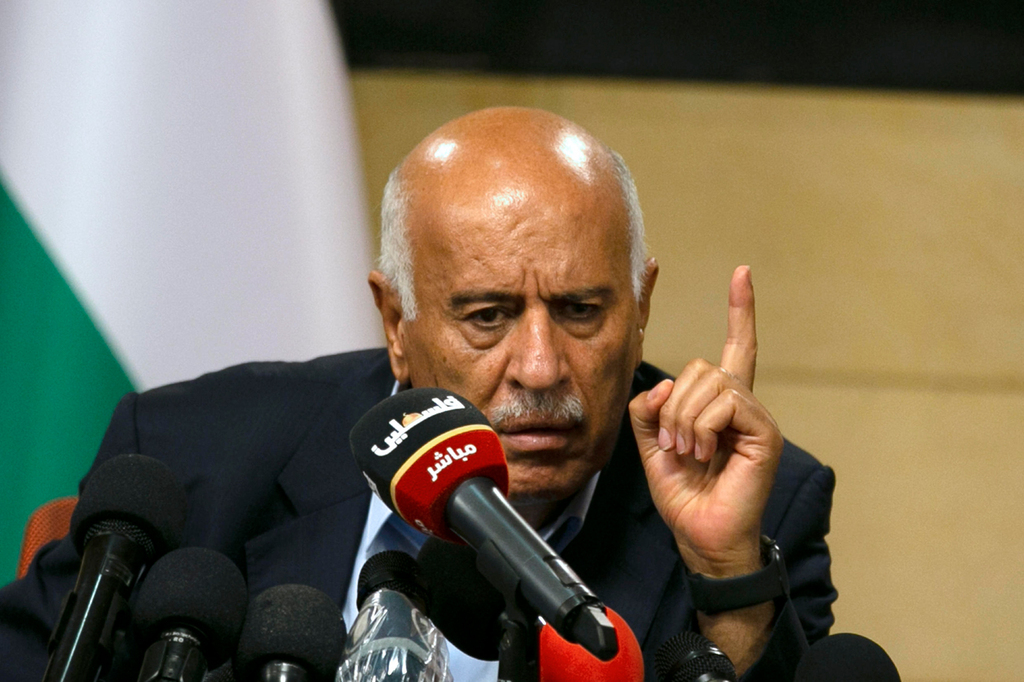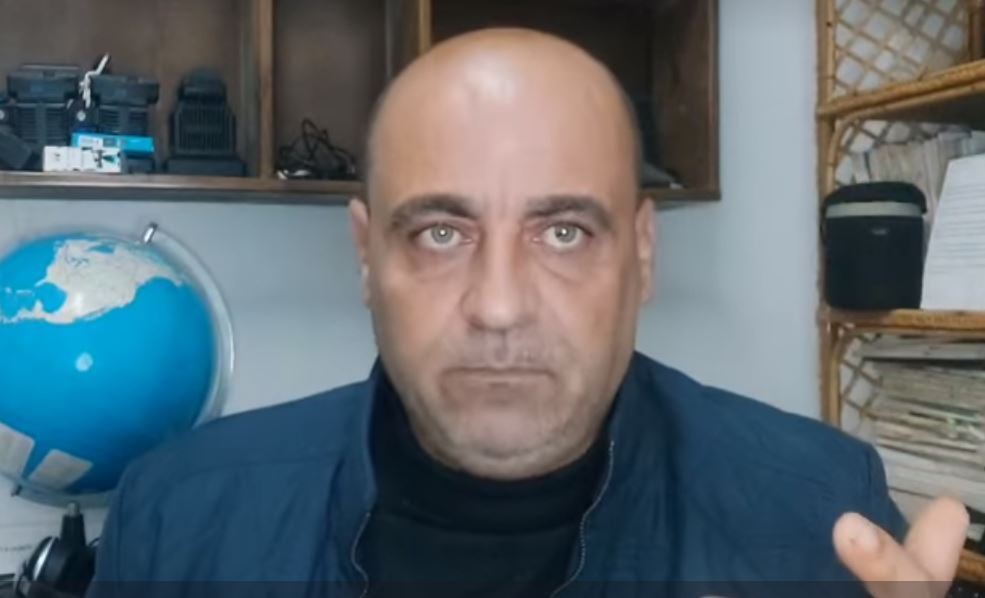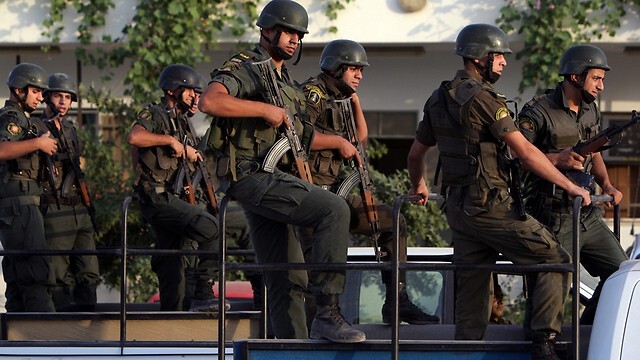A deep schism threatens the unity of the Palestinian Authority, its ruling Fatah movement and the Palestine Liberation Organization amid turmoil among senior officials.
Many of these officials were flabbergasted by Civil Affairs Minister Hussein al-Sheikh’s announcement last week that the PA would restore its relations with Israel, which were cut off five months ago amid Israeli talk of West Bank annexations. They say they were not consulted.
7 View gallery
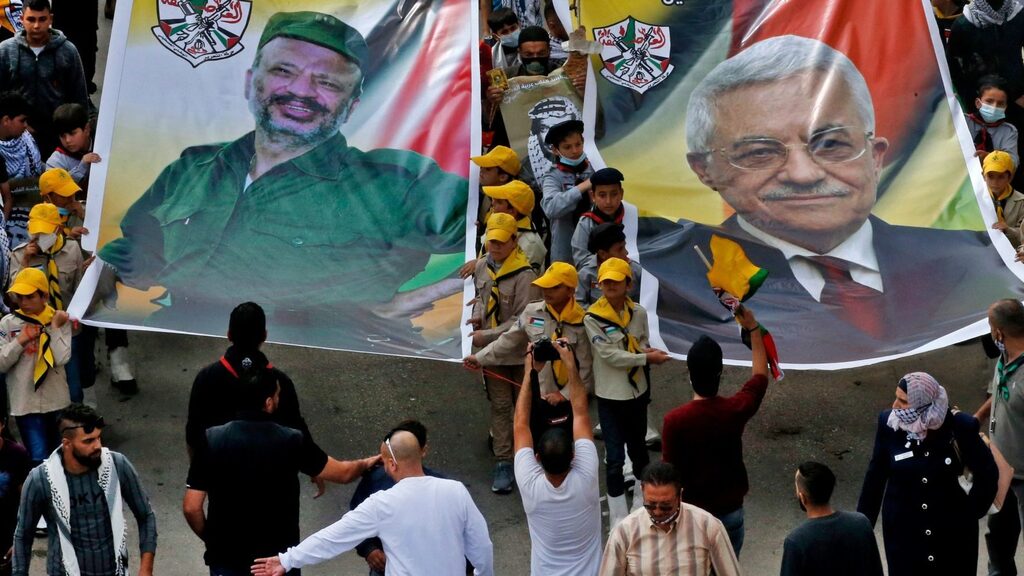

Fatah movement supporters carry portraits of Mahmoud Abbas and Yasser Arafat during a march near the West Bank city of Hebron to mark the 16th anniversary of Arafat's death
(Photo: Getty Images )
A top PLO official who asked to remain anonymous says recent decision-making was unprecedentedly centralized, with Palestinian President Mahmoud Abbas and a tight circle making crucial and pressing choices without referring to official institutions.
“We were not consulted and we did not participate in drafting the decision…. There is a handful of people, including the president, who make decisions, and no one is informed about them,” the official tells The Media Line.
“The PA is governed by one individual. We are ruled by a dictatorial regime,” the official says, adding: “The fear now [is that] the president will continue to make important decisions without consulting the rest of the leadership”
Speaking on condition of anonymity, a member of the Fatah Central Committee says that “tempers are at the boiling point” inside the largest Palestinian faction.
Sheikh announced last Tuesday that the PA’s coordination with Israel would “return to its former state” after “official written and oral assurances” were received confirming Israel’s commitment to agreements. He described the development as a “breakthrough” and “victory” for the Palestinian people.
But Majed al-Arouri, a Ramallah-based legal and human rights expert, says that news of the resumption of security coordination would torpedo both Fatah-Hamas reconciliation talks and plans for overdue elections.
“What happened is part of a major and embarrassing blow to the efforts of Jibril Rajoub, who has been working for several months on the issue of reconciliation and elections,” Arouri says
Rajoub, a senior Fatah figure, was livid when he heard Sheikh’s announcement, according to well-informed sources.
“There are two currents in the PA and Fatah, one of which is serious in its pursuit of reconciliation and wants restored legitimacy for the Palestinian Authority and for us to have a political system based on the existence of a legislative council,” Arouri says.
“On the other hand, there is a current that sees the status quo under the Israeli occupation achieving special economic and social benefits for them and keeping them in positions of influence,” he says.
“These interests of theirs conflict with reconciliation and elections,” Arouri says, adding that the internal conflicts are related to the issue of presidential succession.
Hassan Awwad, a U.S.-based expert on Palestinian affairs, says the division inside Fatah, which controls parts of the West Bank, will now grow wider.
“While Jibril Rajoub [and his group inside Fatah] was negotiating with Hamas to end the internal conflict, Hussein al-Sheikh [and his group] on the other side were undermining his efforts by announcing the return to security cooperation. This is an insult to Rajoub,” Awwad says.
7 View gallery
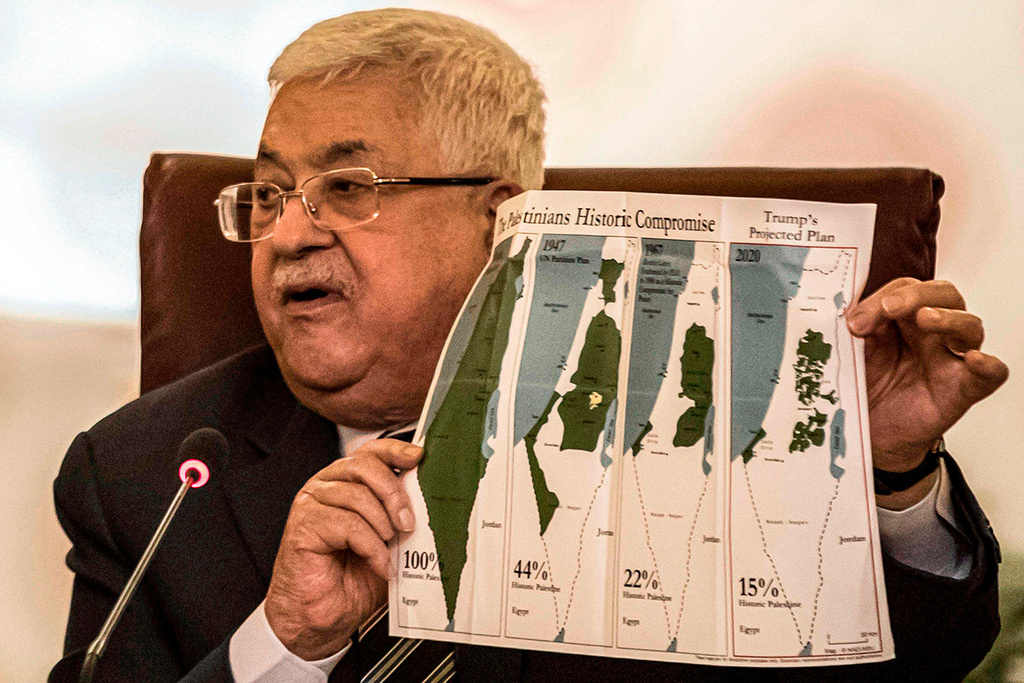

Palestinian President Mahmoud Abbas slams Donald Trump's Mideast peace plan during a meeting of the Arab League in Cairo earlier thsi year
(Photo: AFP)
Abbas, who turned 85 on November 15, has not appeared in public for some time out of fear of the coronavirus. There is confusion and a lack of clarity within the PA, as there are no clear institutional structures that can make decisions.
Arouri argues that this is part of the “weakness” of the PA.
“The decisions made by the PA are guided and linked directly to its internal conflicts, especially since the death [on November 10] of the chief negotiator and the secretary of the Executive Committee of the PLO, Saeb Erekat,” he says.
Erekat’s death has left a huge gap in Palestinian politics. It has also exposed the many people who are interested in the post of peace negotiator and how far they will go to be appointed, Arouri says.
7 View gallery
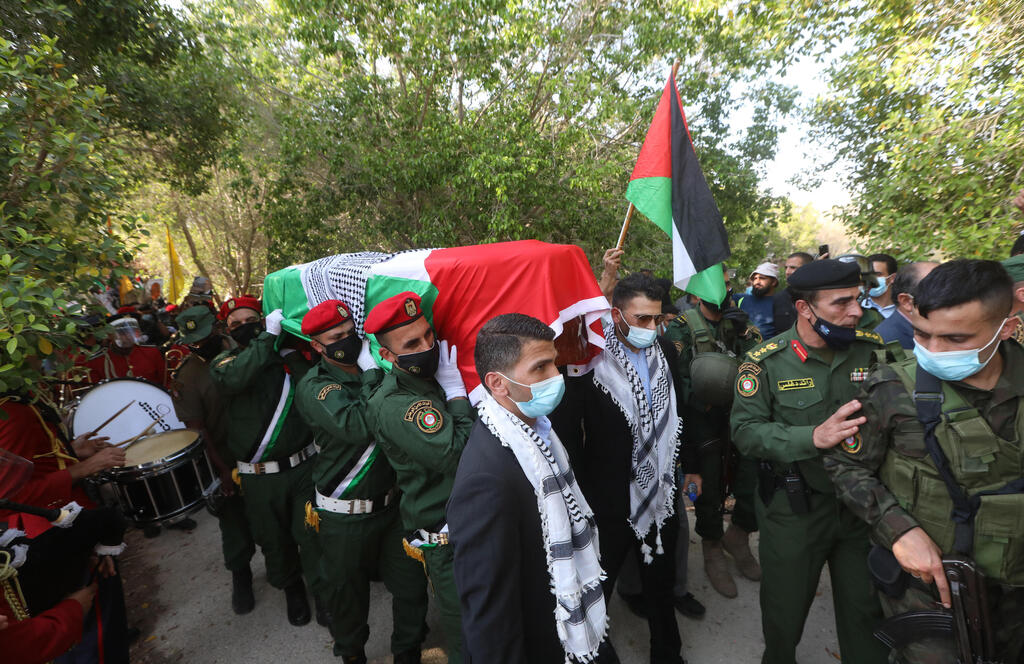

The funeral for veteran Palestinian negotiator Saeb Erekat in his West Bank hometown of Jericho earlier this month
(Photo: EPA)
Awwad believes the PA never really halted security cooperation with Israel.
“The PA’s security forces continued their communications with Israel individually, believing this to be in the interest of both sides,” he says.
The PA, he notes, left “the door open a crack” so it could engage with a Biden presidency.
“It used the Palestinian internal conflict and reconciliation [effort], and the election talk as a tool to pressure the Trump Administration not to overthrow the current leadership,” he says.
Abbas cut all ties with Israel last May, saying the PA was no longer bound by “all its agreements and understandings with the American and Israeli governments, and all its obligations based on these understandings and agreements, including those relating to security.”
His declaration to sever relations included refusing to receive millions of dollars in taxes Israel collects on behalf of the PA.
That decision caused thousands of PA government employees to receive less than half of their salaries for months on end, sending the Palestinian economy into a downward spiral.
Reengaging with Israel means that money will again be transferred to the PA and is likely to provide some financial relief. Yet to the surprise of some PA officials, the move drew widespread criticism from rank and file citizens who say it was complete capitulation to Israeli pressure.
“If you look at the reality of the behavior and reaction of the Palestinian street, even though people are hungry, many are angry at the decision of the Palestinian Authority,” Arouri says.
Nizar Banat, a critic of the PA, posted a video on Facebook, accusing it of collaboration with Israel and shaming Sheikh.
“You are liars; you never suspended the security coordination,” Banat said.
Within hours, the PA’s Preventive Security agency arrested him on charges of “defaming public authorities.”
He was taken to the notorious Jericho Prison based on a complaint filed by Sheikh himself as a private citizen, according to sources.
Banat, a carpenter who resides in the southern West Bank city of Hebron, is a political and social activist and a father of four.
Dr. Issam Abdeen, a Ramallah-based expert on human rights law, says the arrest was meant to stifle dissent.
“It [the PA] intends to intimidate people by [making them] visualize torture and slaughter, and submission to humiliation, a method that failed regimes usually resort to after they go deep into deafness and alienation regarding the suffering and pain of the people,” he says.
“There is concern and fear in the PA” that Banat’s message “will have influence on the street, and this frightens the ruling authority and its apparatus.”
The PA rules with an iron fist, quelling any dissent, Abdeen says.
“The PA believes that its narrative is the dominant one, and thus it slides into [the behavior of] a police state, and anyone who objects will be imprisoned,” he says.
According to Abdeen, the absence of a legislative body that can monitor the executive branch and its apparatuses is part of the problem. The Palestinian Legislative Council has not functioned since the Hamas-Fatah split in 2007.
“The judiciary is in a state of collapse,” Abdeen says. “We are facing a Palestinian political system in crisis that has reached a dead end, in a unique situation unprecedented in the history of the Palestinian Authority.”
Reem Omari, a Palestinian journalist who hosts a popular morning radio show, says that people felt “humiliated” by the news of the reengagement, which followed a letter from Israel’s military coordinator in the territories.
“It [was not even announced by] the Israeli Prime Minister’s Office,” he says.
“The PA’s decision to return to security coordination with the occupation [Israel] was a shock to the people, sparking a wave of anger and criticism from the Palestinian street, especially with the way it was presented to the people.”
The outspoken Omari says people are worried that the PA is preparing for more such announcements.
“The speed with which some decisions are made is worrisome,” he says.
Since Sheikh’s announcement, the PA has returned its ambassadors to Bahrain and the United Arab Emirates, envoys it had recalled after those states normalized relations with Israel in September.
An official in Ramallah confirms that the Palestinian leadership was prepared for the first time to discuss the sensitive and once untouchable salaries the PLO pays to the families of Palestinian security prisoners in Israel and those killed while carrying out attacks.
7 View gallery
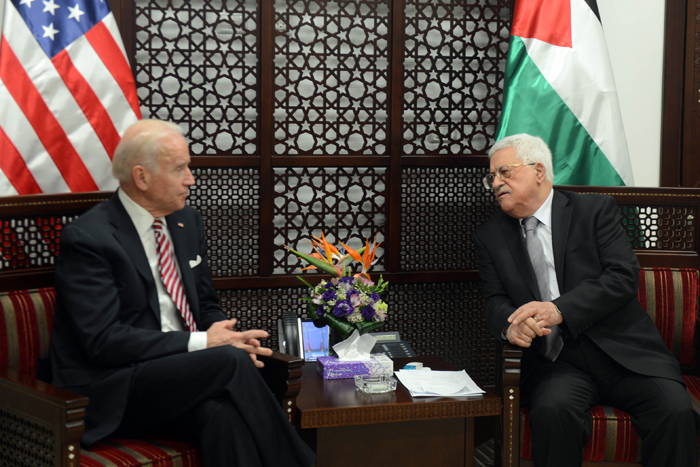

Then-Vice President Joe Biden meeting with Palestinian President Mahmoud Abbas in Ramallah in 2016
This will be a “goodwill gesture to President-elect Joe Biden’s administration,” the official says.
Such an announcement would certainly trigger a tremendous backlash from most Palestinians, with Arouri saying the Palestinians are “approaching a critical decision point.”
“People are no longer convinced by the method of politically taming them in exchange for salaries, and this is why I believe that we are facing a new stage in the Palestinian street’s rejection of the PA’s political orientation, [and] with unusual courage,” he says.
“People are starting to feel that they want radical solutions to their social, economic and political problems,” he says.
“The leaders must be careful,” he warns. “Either they walk on the path of violence regarding these internal conflicts, or they choose elections and democracy.”


